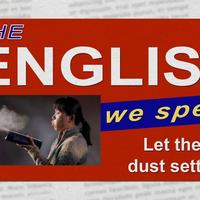Let the dust settle: The English We Speak - YouTube
Feifei: Hello and welcome to The English
We Speak.
I'm Feifei but I'm not sure where Neil is.
Neil: Sorry I'm late.
It's going a bit crazy out there in the office.
Feifei: Crazy?
Neil: Yes. Everybody is arguing and shouting.
Feifei: About what exactly?
Neil: The mess in the office.
The boss says it's untidy
and we should clear up after ourselves.
He even said that my desk was like a pigsty!
Feifei: Hmmm, well you'd better stay in here and keep
out of the way until things have calmed down.
Neil: Good idea. I'll just let the dust to settle.
Feifei: Oh, so the office is messy and dusty.
Is that what everyone's arguing about. The dust?
Neil: No Feifei,
I just mean I'll wait for the situation to calm down.
Feifei: Got it!
So, you're just keeping out of the way.
Are you scared?
Neil: Of course not.
I just wanted to hear these examples…
We've had lots of complaints about the changes
but let's wait until the dust settles
before we respond.
We're busy moving house at the moment
but I'll give you a call when the dust settles.
Now the dust has settled after the restructuring,
I think we can talk about recruitment.
Feifei: This is The English We Speak from the BBC
and we're finding out about the phrase
'let the dust settle',
which means to wait for a
situation to calm down.
Neil: We can also say 'wait for the dust to settle',
which is what I'm doing right now.
Feifei: Neil, I have a feeling you're just
avoiding the situation for one reason.
Neil: Oh yeah, what's that?
Feifei: Look out there.
They're all pointing at your desk.
They're not arguing about a messy office.
They're complaining about your mess.
Neil: Really. Well I like to work in a messy environment.
Feifei: Maybe, but I don't think the dust is
ever going to settle in this argument.
Neil: OK. But I think I'll stay in here for just a little longer.
Both: Bye.

